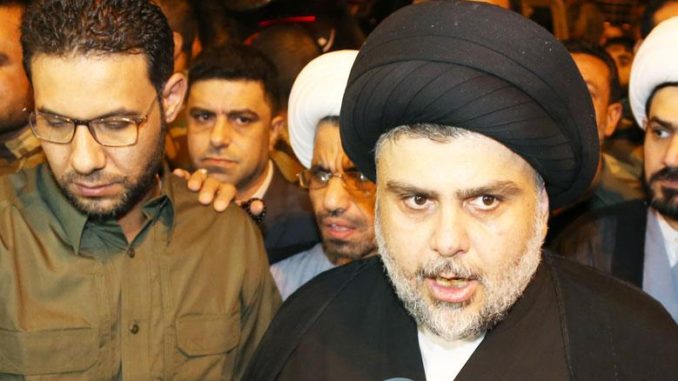
In what could be interpreted as a great day for American interests, Shia cleric Muqtada al-Sadr’s coalition, comprising his Sadrist party and smaller groups representing Iraqi secularists and communists, has been declared the winner of the Iraqi elections. (UK Independent) By including non-religious elements and by campaign against Iranian influence within the Iraqi government, a victory for his coalition could reasonably be seen as a positive for American interests. An anti-Iranian group in control of Iraq, at the time when Iran is working to extend its influence in the Middle East and cement Iraq as a puppet government (a coalition tied to Iranian militant groups came in second), is particularly welcome.
Except that it’s al-Sadr. For those who are unfamiliar with him, an NPR piece interviewing two American veterans has a useful summary:
In 2004, Muqtada al-Sadr and his Mahdi Army fought ferociously against the U.S. in Iraq. Hundreds of U.S. soldiers lost their lives and many more were wounded.
A case can be made that al-Sadr was acting as a nationalist. That is absolutely how he currently frames the argument, and if so then there is a case to be made for forgiving the past, particularly in view of the rise of nationalism over traditional patriotism throughout the Western world. A key argument used in the most recent Presidential election is that God often uses flawed people as his agents and that prior actions are not indicators of future activity. That argument could be extended to al-Sadr.
Unfortunately, that case does not hold water, even for those who have believed similar contentions in the past. al-Sadr’s attitude toward the United States was summed up in a quote to 60 Minutes when discussing his action against the American “occupation”. From CBS:
“The little serpent has left, and the great serpent has come.”
That was more than a decade ago. It was also after he had lived through the iron-fisted reign of Saddam Hussein. While al-Sadr has maintained consistency in a nationalist viewpoint fighting against perceived occupiers – first the United States, then Iran – it is unreasonable to believe that, between the pair, a prominent militant Shia cleric will reliably side with an enemy that favors Jews and Christians over an enemy that shares his Shia beliefs.
Recent years have seen al-Sadr’s army rise in prominence as they fought against ISIS. (Daily Mail) For those who viewed the Middle East situation as merely a fight between Israel and the rest of the region and ISIS vs. the surrounding countries, this would seem to be a mitigating factor, an indication that al-Sadr may be softening his stance toward world powers. ISIS, however, was a Sunni-based group and was also, in al-Sadr’s view, occupiers. Their effective eradication has plausibly strengthened al-Sadr’s views against international relations, not softened them.
al-Sadr may be seen as a potential ally in the Middle East as the United States attempts to stifle Iran’s growth. Such a decision should be approached only with an abundance of caution, however, and an expectation of betrayal.
